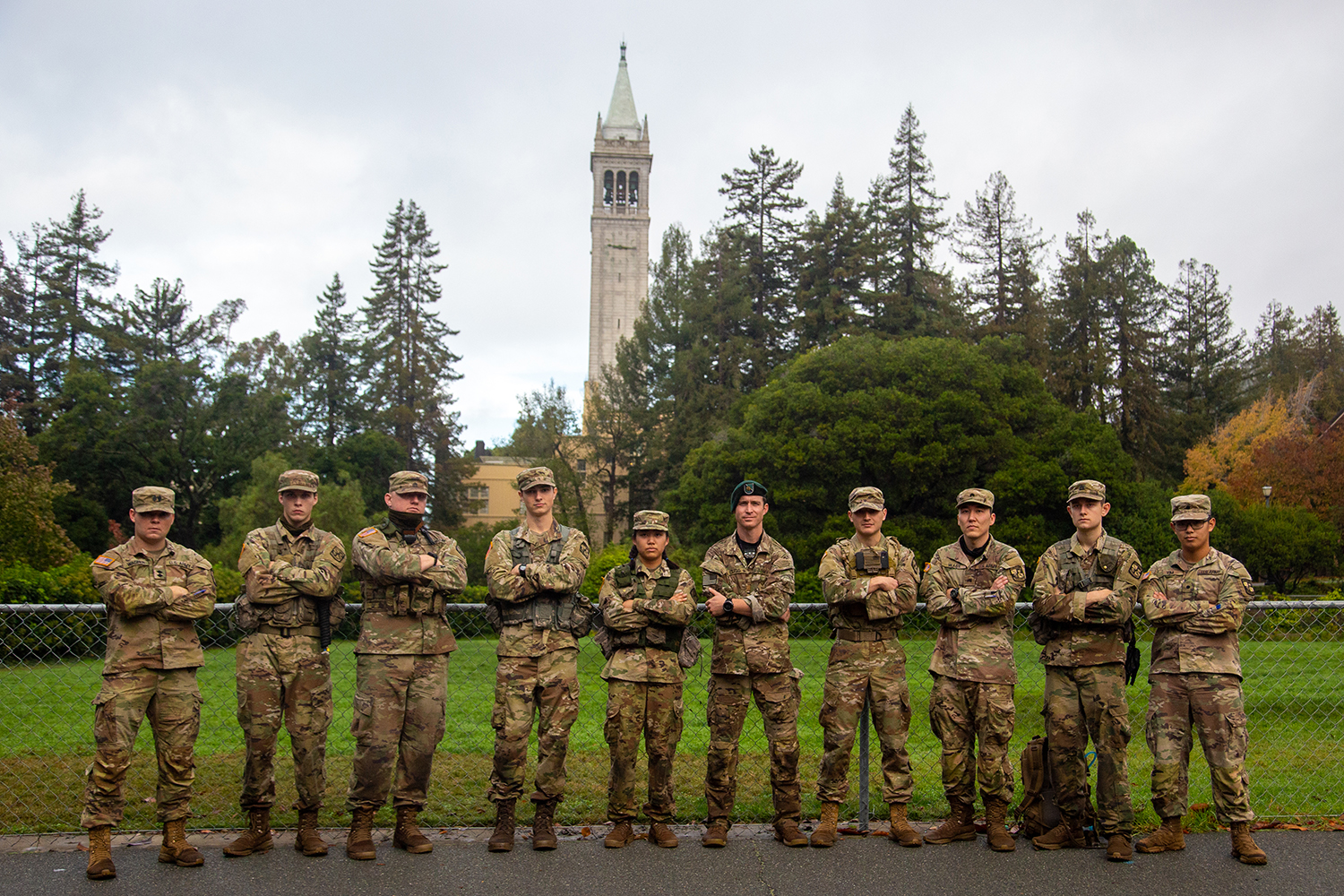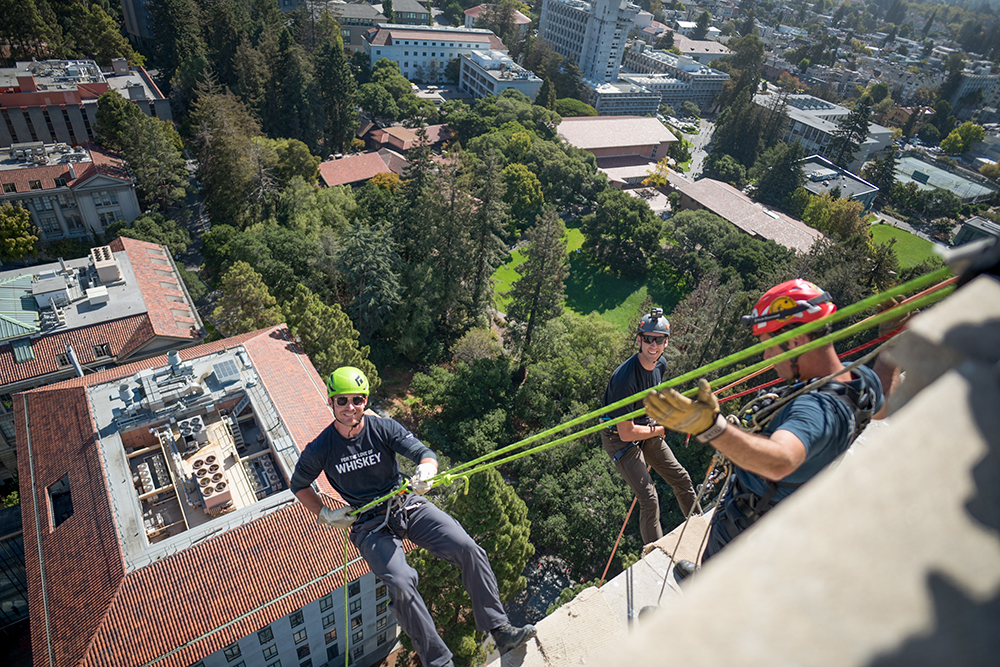Major, U.S. Army, Special Forces
Education: Virginia Tech (B.A. Geography); George Mason, School of Public Policy (M.S. Peace Operations)
Affiliations: Co-founder, Legal Obstacles Veterans Encounter (student-led pro bono project); Assistant Professor of Military Science, U.C. Berkeley Army ROTC (Army Reserves); Editorial Board, Irregular Warfare Initiative (Joint venture between the Modern War Institute at West Point and the Empirical Studies of Conflict Project at Princeton University)

I graduated from Virginia Tech in 2007, weeks after a mass shooting took 32 classmates from our community. I was planning to return home to D.C. or teach locally after undergrad. The senselessness of the incident and insecurity it bred in my community motivated me to alter my path and enter service. I enlisted in the Army that July. By September, I was enrolled in Fort Benning, Georgia’s Infantry School.
In the process of seeking the best route to enter service, I found an opportunity to pair Army ROTC with a graduate program at George Mason University (GMU) called Peace Operations. The Peace Ops curriculum focused on counterinsurgency, stability operations, conflict resolution—very much aligned with what I thought might add value to my career choice. The class was a mix of military officers, diplomats, and aid workers, with a faculty including GEN(R) Mike Hayden and Dr. Janine Davidson. The shared career experiences from this dynamic group were formative for me as a new soldier straight out of Sand Hill.
While at GMU, I was a cadet and served in the Virginia National Guard. I was fortunate to attend a few additional training opportunities like Airborne School, which teaches a group of paratroopers to jump out of an aircraft together at about 1,200 feet; Air Assault School, where we rappelled from helicopters; and Vermont’s Mountain Warfare School where we learned to survive in the mountains, ice climb, and tie knots. All of these skills came in handy this semester when I had the opportunity to rappel from the Campanile with friends from the Berkeley Fire Department.

In addition to the classroom and training curriculum, I was able to compete on GMU’s Ranger Challenge team against regional ROTC programs in skills like navigation and team problem solving. We won our regional competition and the team went on to West Point’s Sandhurst Competition. Twelve years later, I coach the Berkeley ROTC Ranger Challenge team. Training a group of talented young cadets how to work as a team has been a great mental health reprieve from the rigors of law school. The future officers I mentor are smarter than I was at that age. They are Bears, and they don’t shy from physical adversity.
After GMU, I commissioned into the Infantry and went back to Georgia for the Officer Course and Ranger School. By April 2011, I was a platoon leader in Afghanistan with 3-71 CAV from the 10th Mountain Division for a 12-month trip. We were assigned to a tennis court sized outpost in a pomegranate orchard along the Arghandab River. Before we arrived, the 101st Airborne fought with the Afghan National Army (ANA) for every inch of the valley. In that fight, the Taliban embedded IEDs in each home to defend the terrain and most homes were destroyed. Our mission was to live within the village, provide security, and manage the reconstruction. We built trust with the agricultural community as their economy recovered and, despite dealing with an active IED cell, there was only one direct fire incident in the six months we patrolled the orchards. Since the Taliban were quiet, we left the area.
Our platoon was relocated to a larger base in western Kandahar Province. Our job from there was local security in a new village and support to brigade clearance operations across the district. The Taliban were active, and we faced resistance whenever we were in an area the locals and Taliban knew we would not stay. The local population justly assessed it was a better short and long-term bet to cooperate with Taliban intimidation than to be honest with our sporadic counter-opium patrols. We were inserted by truck or helicopter into a remote area, we would patrol until we made contact, then fight our way through. This approach was not sustainable back in 2011, and men and women from my platoon were lost.
It was clear at my early stage of direct involvement that the goal of a stable Afghanistan required a commitment by more than just the NATO militaries. The military carried the burden of counterinsurgency, which involved training a reliable army, building a legitimate economy, and balancing corruption with legitimate governance functions. By 2016 or so, as the military presence was reduced to special operations forces, the other tools of US foreign policy were further sidelined. The military presence was enough to keep a finger in the dam that held back Taliban control for a few years, yet the rapid collapse of the Afghan government this summer made clear the fragility of NATO investments over two decades. The less than whole-of-government contributions to Afghan stability restricted American ingenuity and sapped domestic political will to sustain the limited special operations footprint that existed into 2021.
It’s hard to convince someone from a different background that it’s worth it to trust the American military right now. The military mission failed and the Afghan people suffered, but I would argue that American support to Afghans is not over. Those Americans that contributed, gave a large population of Afghani young people an opportunity to see what could be. They went to school, they had jobs and livelihoods, they had hope. Right now, we’re seeing terrible stories of the Taliban’s repressive tactics, yet we can be inspired by the evacuation assistance driven by the personal relationships built between Americans and Afghans.
When Kabul fell, former colleagues from the Army along with members of the diplomatic and press corps who served in Afghanistan organized heroic privately funded rescue efforts to extract as many Afghans as possible. A lot of Americans, those that went back in uniform and many in their private capacity, dedicated themselves to help get families out. A squad of Marines and a member of Army Special Forces Command gave their lives assisting the evacuation. These individual sacrifices gave Afghan families that landed at American airports opportunity. This collaboration gives me tremendous pride in Americans who do the right thing for a partner. I believe the evacuation continues to be a testament to everything that is right about the character of America’s citizens and public servants.
Seeing Berkeley Law do so much to help Afghans evacuate [see here, here, and here] gave me a deep sense of pride in my choice to be a part of this community. I told buddies back at Bragg about the Law School efforts to bring Afghan lawyers and scholars to safety, and to investigate and document human rights abuses by the Taliban. Special operators recognized the shared mission with the Berkeley community. It’s disappointing that in today’s domestic climate that more conservative places like Bragg and liberal places like Berkeley look at each other as if one is less American. President Kennedy saw the essential nature of both the University of California and the Army Green Berets to protect American values during a period as troubled as our current environment. In the case of the Afghan evacuation, the core values and innovative natures of two of my communities overlapped to contribute positively to a shared cause, and that pride is immeasurable.
Following my time in the Infantry, I trained at Fort Bragg, North Carolina’s JFK School of Special Warfare. The Special Forces Officer curriculum traces its roots to World War II’s Office of Strategic Services, and teaches small unit support to indigenous partners to achieve shared goals. I deployed twice to northwest Africa in command of an Operational Detachment-Alpha and later supported operations across Africa, Syria, North Korea, and Afghanistan. While deployed to Niger in 2017, my Detachment had the unfortunate responsibility of recovering the bodies of four Green Berets killed while fighting through an ambush. The investigations that followed placed blame on my friends for being cowboys. This internal assessment was untrue and ignored their integrity. Watching the organization tarnish the honor of my friends and ignore their valor, while the families of the fallen were lied to, led me to step away from active service.
In May of 2020, just as the pandemic was impacting nationally, my wife and I packed up our toddler, two dogs and two cats, and we camped for the 11 days from Bragg to Berkeley thinking we could avoid the social health situation. It was a wild trip and I do not recommend a road trip with cats. When we finally came out of the Caldecott Tunnel to see the Golden Gate Bridge right there in front of us I immediately forgot about the longest convoy of my life. Seeing that symbol of America after an exhausting journey will be a lifetime memory.
Helping men and women of the American veteran community is a priority for my legal career. Last summer I worked in the Swords to Plowshares legal unit. The opportunity to learn from their experienced attorneys, and to gain exposure to the issues faced by our Bay Area veterans, developed a broad awareness of how to be effective in veterans law. This year, I was fortunate to work with fellow veteran classmates Tyler Baylis ’22 and Blaine Manire ’23 to launch Legal Obstacles Veterans Encounter (L.O.V.E.), a new student-led pro bono project (read more about the project here and contribute here to the Pro Bono Fund, which supports L.O.V.E. and other opportunities for students to engage in pro bono work). I also do direct client work with the Veterans Law Practicum supervised by Professors Olivia Cole and Rose Carmen Goldberg. The process for a deserving veteran to secure earned benefits should be simple, but since it is artificially difficult, it requires an advocate. As I transition careers, the opportunity to fight for veterans while a student is professionally fulfilling. The course of my legal career is uncertain, but Berkeley Law is providing the skills and relentless attitude necessary to become an effective advocate.
The views expressed are those of the author and do not reflect the official position of the United States Department of the Army or Department of Defense.